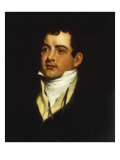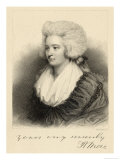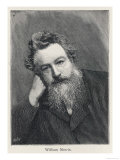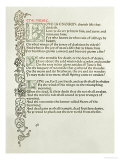|
|
|
|
Thomas Moore
b. 5-28-1779; Dublin, Ireland
d. 2-25-1852; Sloperton
Poet, singer, songwriter, and entertainer Thomas Moore is now best remembered for the lyrics of The Minstrel Boy and The Last Rose of Summer. He is considered Ireland's Bard, a corresponding honor of Robert Burns to Scotland.
• Thomas Moore at Amazon
|
|
|
|
Hannah More
b. 2-2-1745; Fishponds, Bristol, England
d. 9-7-1833; Bristol
Hannah More, a teacher, religious writer, philanthropist and social reformer, was one of the most influential women of her day. She associated with the intellectual society of England: actor and playwright David Garrick, painter Joshua Reynolds, Samuel Johnson, Edmund Burke, and Elizabeth Montagu (Blue Stocking Society); later she influenced abolitionist William Wilberforce. She was accused of “Methodist” tendencies for teaching farm children to read because workers who could read would would leave the farms and that would be “fatal to agriculture”.
• Hannah More: The First Victorian
|
|
|
|
Christopher Morley
b. 5-5-1890; Haverford, Pennsylvania
d. 3-28-1957; New York
Journalist, novelist, essayist and poet Christopher Morley is perhaps best remembered for his 1939 novel Kitty Foyle, which was made into an Academy Award-winning movie. He also was an enthusiast for the Sherlock Holmes stories, a founder of the literary group named the Baker Street Irregulars, and one of the first judges for the Book of the Month Club (c. 1926).
Christopher Morely quotes ~
• “All cities are mad: but the madness s gallant. All cities are beautiful: but the beauty is grim.”
• “The courage of the poet is to keep ajar the door that leads into madness.”
• “High heels were invented by a woman who had been kissed on the forehead.”
• “The real purpose of books is to trap the mind into doing its own thinking.”
• “Read, every day, something no one else is reading. Think, everyday, something no one else is thinking. Do, every day, something no one else would be silly enough to do. It is bad for the mind to continually be part of unanimity.”
• “There is only one rule for being a good talker - learn to listen.”
• “No one appreciates the very special genius of your conversation as the dog does.”
• “There are three ingredients to the good life; learning, earning, and yearning.”
• “Man makes a great fuss about this planet which is only a ballbearing in the hub of the universe.”
• “People like to imagine that because all our mechanical equipment moves so much faster, that we are thinking faster, too.”
• “There is only one success - to be able to spend your life in your own way, and not to give others absurd maddening claims upon it.”
• “Man, an ingenious assembly of portable plumbing.”
|
|
|
|
William Morris
b. 3-24-1833; Walthamstow, England
d. 10-3-1896; London
William Morris, an English writer, artist, socialist, activist, leader in the English Arts & Crafts Movement, and non-practicing architect, also founded the Kelmscott Press in order to produce examples of improved printing and book design.
The poem illustration is from Love is Enough, or The Freeing of Pharamond: A Morality (1872) by William Morris incorporating a Kelmscott Press typeface.
The Music VI
Love is enough; cherish life that abideth,
Lest ye die ere ye know him, and curse and misname him;
for who knows in what ruin of all hope he hideth,
On what wings of the terror of darkness be rideth?
And what is the joy of man's life that ye blame him
for his bliss grown a sword, and his rest grown a fire?
• News from Nowhere and Other Writings, William Morris
• Garden of Delight print
|
|
|
|
|
|
|
Mourning Dove
b. 1888; Idaho
d. 8-8-1936
Mourning Dove was the pen name of Christine Quintasket, an Okanogan Indian of the Northwest coast. She put her mission education to use in the service of her native culture by becoming an important chronicler of the life ways of her people, thus preserving knowledge that might have been lost.
Mourning Dove’s best-known book, Coyote Stories, first published in 1933, is one of the first collections of native stories that was gathered and transcribed by a Native American.
|
|
|
|
|
|
|
Iris Murdoch
b. 7-15-1919; Dublin, Ireland
d. 8-8-1999; Oxfordshire, England (Alzheimer's disease)
Anglo-Irish writer and philosopher Iris Murdoch is on The Times 2008 list of 50 greatest English writers since 1945.
FYI - Murdoch was entered in a Froebel Demonstration School in 1925.
• “People from a planet without flowers would think we must be mad with joy the whole time to have such things about us.”
|
|
|















